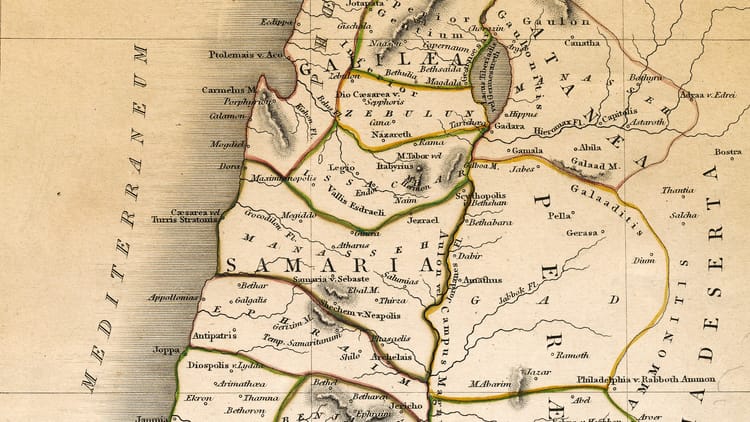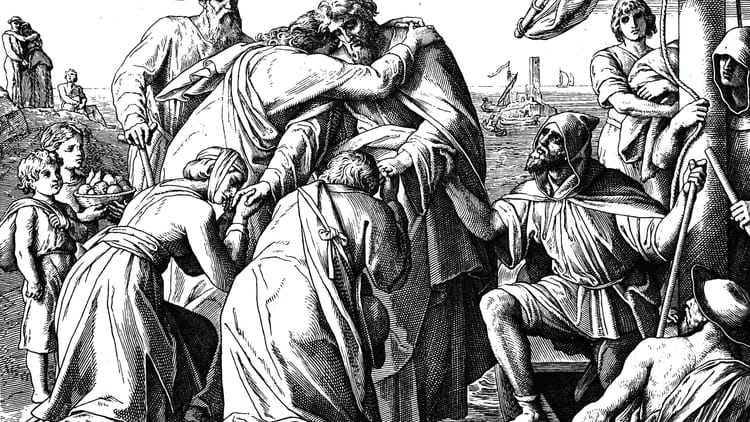Paul’s Great Goodbye (Acts 20:17-38)

Big Idea: Saying goodbye well involves appreciating the past, following God’s lead despite challenges, and preparing the church for a strong, Spirit-led future.
One of my high school teachers used to twist a familiar saying. Instead of saying "one last kick of the can," he'd say "one last kick at the cat." He obviously wasn't an animal lover, but I always thought his version was slightly more picturesque than the usual one.
Well, I've got three last kicks at the cat here at Park Lawn. Some pastors use the chance to share thoughts they were afraid to voice before, fearing they might lose their jobs. Somebody said, "Nothing changed after our pastor resigned, except his sermons became a little more frank." That's not going to happen here – I've never held back! But I'm going to begin a short and unusual series on saying goodbye.
Saying goodbye can be difficult and drawn out, or it can be elevated to an art form. I want to elevate the art of saying goodbye, so over the next three Sundays, I'll explore three of the greatest goodbyes in the Bible. Saying goodbye has some obvious benefits. It allows us to reflect on where we've been together. It helps us to appreciate one another, and reminds us not to take our relationships for granted. It reveals the true nature of the relationship we've had together. And it allows both of us to stand on our own, to see what we're really made of.
Saying goodbye can also be difficult. I guess it all depends on who you're saying goodbye to. Some pastors resign, and the service is extended for half an hour for a spontaneous outburst of praise choruses! But the apostle Paul models for us what it means to say a healthy goodbye.
Please open your Bibles this morning to Acts 20 as we examine one of the greatest goodbyes in the Bible. I just completed a course on the apostle Paul. It's easy to develop a picture of Paul that is inaccurate. It's certainly easy to think of the apostle as a prickly and distant character. Here, we see Paul as a human being facing the tough challenge of saying goodbye to loved ones in a church, possibly for the last time.
Paul was traveling to Rome, despite the advice of early Christians, and passed by Ephesus, a city he had previously visited. He couldn't pass by without calling for the leaders of the Ephesian church for a very emotional farewell. I've identified three characteristics of a goodbye that relate to our situation today. Three lessons, if you will, on how to say a good goodbye.
Saying Goodbye Means Appreciating Our Past Relationship
When Paul meets the Ephesian elders, he reflects on their past relationship and emphasizes the integrity of his ministry among them. Read with me:
When they arrived, he said to them: "You know how I lived the whole time I was with you, from the first day I came into the province of Asia. I served the Lord with great humility and with tears, although I was severely tested by the plots of the Jews. You know that I have not hesitated to preach anything that would be helpful to you but have taught you publicly and from house to house. I have declared to both Jews and Greeks that they must turn to God in repentance and have faith in our Lord Jesus." (Acts 20:18-21)
When saying goodbye, it's easy to look back at the past. Paul states that he was eager to jump in from day one of his ministry with them. His motive was simple: he wanted to serve the Lord (verse 19). He wasn't in it to make money, and he wasn't in it for his ego. His only motive was to serve the Lord. The manner of his ministry was also simple. The entire time he was with them, he lived a consistent life and served the Lord with humility and tears. And his message was well known to the Ephesians (verses 20-21):
...he didn't hesitate to preach anything, but told sinners to repent and have faith in the Lord. He had ministered to both Jews and Gentiles, and preached a balanced message, not hesitating to include anything that would be of benefit to the congregation.
In short, Paul had an exemplary ministry while he ministered in Ephesus. The thing I like about Paul is that he didn't have to hang his head in shame when he left them. Paul could look back and praise God for an effective and credible ministry while he was among them. Were there problems? Of course! Just read Acts 19. I guess you could call a riot a bit of a problem! But Paul could look back without shame or regret, and praise God that his motives, manner, and message were beyond question while he was among them.
I learn from Paul an important lesson here. It's important, as we say goodbye to each other these next few weeks, that we appreciate our past. I'll never forget the warmth and enthusiasm I felt the first time I entered the church. I won't forget my first sermon here, the first baptism. I also won't forget the first time I ran into problems here, and yes – like any pastor – I've received some scars. There have been good times, and there have been times I've pulled out my hair. But like Paul, I can look back at our time together and say, "Praise God for what we've been able to accomplish here!" Let's take a moment to appreciate our seven years together and the relationship we've built. And please hear me: I appreciate you and what you have done.
Saying goodbye means appreciating our past relationship. Paul also teaches us a second lesson.
Saying Goodbye Means We Accept God's Leading Above Our Own Desires
And now, compelled by the Spirit, I am going to Jerusalem, not knowing what will happen to me there. I only know that in every city the Holy Spirit warns me that prison and hardships are facing me. However, I consider my life worth nothing to me, if only I may finish the race and complete the task the Lord Jesus has given me–the task of testifying to the gospel of God's grace. "Now I know that none of you among whom I have gone about preaching the kingdom will ever see me again. Therefore, I declare to you today that I am innocent of the blood of all men. For I have not hesitated to proclaim to you the whole will of God. (Acts 20:22-27)
Paul says in verse 22 that he is "compelled by the Spirit" to leave for Jerusalem. It didn't make a lot of sense. Everywhere he visited, the Holy Spirit told him through prophecies that jail was waiting for him ahead. I don't think anyone really wanted Paul to leave. Even Paul likely had moments of doubt. But I love verse 24:
But my life is worth nothing unless I use it for doing the work assigned me by the Lord Jesus – the work of telling others the Good News about God's wonderful kindness and love. (Acts 20:24 NLT)
Paul is saying, in effect, "I don't care if I end up in jail – I have to go where the Spirit takes me. I don't know what is going to happen, but I know I'm following Jesus." Paul is subtly reminding the Ephesian elders that, despite their reluctance for him to leave, they must accept God's will. I could preach a whole sermon on sensing God's will, but what I know is this: when God calls, you had better listen. And just as we sensed very clearly that God led us to Park Lawn, we have sensed very clearly that it is time to move on.
I don't want to get too mystical, but I really believe that God brought us to Park Lawn for a reason. And I also believe that now he's led us somewhere else for a reason. It's reassuring to know that God is preparing Park Lawn Baptist Church for something better than what you've experienced before. Because God has a reason for leading us away, and we wouldn't be leaving if we didn't believe that. Leaving loved ones is difficult, but Paul shows us that obedience surpasses personal preferences and safety.
Jumping ahead for a minute to the end of Paul's message, we see how the people reacted. When he had said this, he knelt down with all of them and prayed. They all wept as they embraced him and kissed him. What grieved them most was his statement that they would never see his face again. Then they accompanied him to the ship. (Acts 20:36-38) Nobody wanted Paul to leave, but if Paul is compelled by the Spirit, he had better go. And if we are compelled by the Spirit as well to move on, we had better go!
Saying goodbye means we appreciate our past relationship. It means that we accept the Spirit's leading. There's one more lesson we discover in this passage:
Saying Goodbye Means We Carefully Prepare For The Future
Keep watch over yourselves and all the flock of which the Holy Spirit has made you overseers. Be shepherds of the church of God, which he bought with his own blood. I know that after I leave, savage wolves will come in among you and will not spare the flock. Even from your own number men will arise and distort the truth in order to draw away disciples after them. So be on your guard! Remember that for three years I never stopped warning each of you night and day with tears. "Now I commit you to God and to the word of his grace, which can build you up and give you an inheritance among all those who are sanctified. (Acts 20:28-32)
Paul brought his message to a close by warning of the dangers they would have to deal with. And I need to tell you that there are very real dangers ahead in Park Lawn's future. Paul warns about two dangers. There are dangers outside the church (verse 29) – false teachers, who like wolves, want to come in and ravage the church. There are dangers within the church (verse 30) – sometimes people within the church can destroy the church. Paul pleads with the Ephesian leaders to be on the lookout and protect the church after he's gone. Paul once again, in verses 33 to 35, emphasizes that his ministry was not one of laziness or greed for money. Paul doesn't want others who minister for selfish motives to come into the church and destroy it after he leaves.
Park Lawn, I could go on for hours about the dangers that lie ahead for you. There is a danger that you can drift away from the gospel. There is a danger that you could become complacent and comfortable, and lose your vision and courage. You could fail to live up to the purpose that we've defined for ourselves – to bond, to grow, to serve, and to win. That could be thrown in the wastebasket and forgotten. There is a risk that you may not envision the future creatively or take this opportunity to dream about what God wants to achieve in this church and community. There is a danger that you won't reach the lost people of this area for Christ.
There's a crying need for strong, effective leadership. Leadership that doesn't come from Paul in Ephesus, or from the pastor in this church. Leadership that will survive the removal of one person from the church. Leadership should think boldly and creatively about future possibilities while being cautious of potential dangers that could harm the church. The time for my leadership in this church is over. But the time for your commitment and vision for this church is not.
But Paul's desire for the Ephesian church is my desire for Park Lawn Baptist Church:
And now I entrust you to God and the word of his grace – his message that is able to build you up and give you an inheritance with all those he has set apart for himself. (Acts 20:32 NLT)
My greatest desire for Park Lawn is that God would build you up and give you an inheritance with all God's people. I desire that Park Lawn become a prevailing church, so that even hell can't withstand its force. I pray that God would protect and nurture God's people in this church so that the best years of ministry – the greatest number of baptisms, the greatest intimacy with God – so that the best is still ahead.
Paul teaches us quite a bit about saying goodbye. He reminded us to cherish our time together, follow the Spirit's guidance, and prepare for the future. I'm excited, because we're both on the threshold of a new adventure. With God's help, and God's future leading, who knows what blessings lie ahead? Saying goodbye isn't easy, but with the lessons we learn from Paul's goodbye, it's a little bit easier. There's one more great goodbye we'll cover next week.
But for now, I hope you'll pray with me that our time together will reflect the words written on an old burial plaque 300 years ago.
In the year of 1653, when all things sacred were throughout the nation destroyed or profaned, this church was built to the glory of God by Sir Robert Shirley, whose singular praise it was to have done the best things in the worst times."
Like the Apostle Paul and Sir Robert Shirley, let it be said that we built our ministries for God's glory by doing our best in tough times. Let's cherish our time together, embrace the Spirit's guidance now, and look ahead with hope and caution for the future. May the best years of my ministry and the ministry of Park Lawn Baptist Church still lie ahead.





